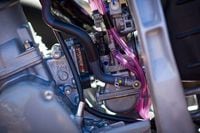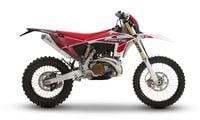We last rode Yamaha’s YZ125X in 2020 in South Carolina, and the bike has undergone some exciting updates since then. For 2023, the Tuning Fork brand made changes to the engine, suspension, bodywork, brakes, ergonomics, and brakes. To help us learn more about the 2024 Yamaha YZ125X, the bLU cRU invited us back to Randy Hawkins’ property to see how the bike performs with the updates. We spent the day riding and learning how much better the YZ125X is.
The YZ125X engine was overhauled in 2023, featuring a new cylinder, cylinder head, piston, connecting rod, crankcases, and expansion chamber (aka exhaust pipe). The compression ratio and Yamaha Power Valve System (YPVS) have been specifically tuned for off-road. There’s a new Keihin PWK 38S carburetor that feeds the air and fuel mixture through the new VForce4R reed block.
Compared to the motocrosser, the YZ125X has a one-tooth-larger rear sprocket. Combined with the off-road-specific YPVS and CDI tune, the blue off-roader boasts better roll-on torque than expected.
Since the six-speed gearbox is a close-ratio, there’s no problem finding the correct gear for most situations. Credit should be given to the excellent carburetion. While some manufacturers have gone to electronic fuel injection (EFI) on their two-strokes, it’s hard to beat a carburetor feeling, especially on smaller-bore bikes.
Related: 2022 Yamaha YZ250FX Review
Yamaha’s motocross, cross-country, and enduro models use KYB suspension with a Speed Sensitive System (SSS) 48mm coil-spring fork and a shock with Kashima-coated internals to reduce friction. The front and rear suspension is fully adjustable for compression and rebound damping. Spring rates and internal valving are set up to meet the demands of off-road racing.
The combo of Yamaha and KYB is like peanut butter and jelly. The suspension components are tried and true, and the internal settings are accurate for the required task. It performs very well for off-road riding. At the same time, it is on the softer side, but that’s to be expected. In stock form, the target is most likely a 135–160-pound younger rider. However, it’s still within a very reasonable range for my 180-pound frame.
The YZ125X has an aluminum backbone-style frame that has been in production for about two decades. Even though it has been around for a while, its new bodywork, flatter seat, and improved ergonomics give it a very up-to-date feel.
Of the Yamaha YZ line, the two-stroke chassis is the most comfortable. It’s a natural feeling when you swing a leg over it. Like the engine, this chassis feels light and free, ready to go in whatever direction you point it.
The chassis has many of the same components as the 250F and 450 models. This means the most current brakes, which were upgraded to a new front caliper and 270mm rotor last year. When you consider that these are the same brakes used on the Tuning Fork brand’s four-stroke cross-country models that are roughly 30–40 pounds heavier (according to claimed specifications), you know they should be more than adequate on the YZ125X.
The YZ125X is intended to be more of an entry-level or step-up bike for a younger rider coming from an 85cc machine. I don’t get many opportunities to ride this type of motorcycle, and am always excited to discover how much they have advanced.
Its carbureted liquid-cooled two-stroke 125cc single-cylinder engine is quite impressive. While it doesn’t have an overly broad powerband, it’s wider than expected. Carburetion was spot on for the cooler-than-normal (40–45 degrees Fahrenheit) temperatures we tested in. The engine pulled very well on the GP-style motocross track and was easy to manage so long as I kept a quick trigger toe on the shifter. Keeping it on the pipe without spinning the rear tire was a little more challenging on the tighter enduro-type trails that were wet and slippery. Good clutch and rear brake control were necessary in those conditions.
The suspension was exactly as I would have hoped. It’s softer than average, but based on this bike’s targeted rider, I would say it’s just about perfect. Even though it’s softer for my 180-pound frame, it’s still very raceable. If you’re under 160 pounds, you should be able to tune the fork and shock to your preference. If you’re above 170 pounds, you may want to get the next stiffer spring rate for both ends.
I hadn’t ridden a 125cc two-stroke in about four years, and had completely forgotten how light and nimble they are. We talk about some 250cc four-stroke motocross and cross-country models getting lighter and more agile, but they can’t hold a candle to how this bike handles. You can move and turn at will, and because of its physical light weight and light engine power, you rarely feel out of control.
Overall, the YZ125X once again exceeded my expectations. It has some excellent off-road features, but you might want to add more items like a larger gas tank, skid plate, and hand guards, especially if you’re a serious racer. There could be some room in the budget for those parts considering Yamaha’s smallest-displacement off-road competition dirt bike is $1,200 less than the closest-priced competitor in the segment and with an MSRP of $7,199, it’s the most affordable 125cc cross-country model on the market.
Helmet: Bell Moto-10 Spherical
Goggle: 100% Accuri 2
Hydration Pack: Fly Racing XC 30
Jersey: Fly Racing Kinetic Prix
Gloves: Fly Racing Kinetic Prix
Pants: Fly Racing Kinetic Prix
Boots: Alpinestars Tech 7
Number Plate Backgrounds: DeCal Works preprinted










/cloudfront-us-east-1.images.arcpublishing.com/octane/XZIE43UTW5GWFHMGGD4U4BQF2Q.jpg)
/cloudfront-us-east-1.images.arcpublishing.com/octane/RYRJIZJ7NJAFHN5HBV2V5PB2TE.jpg)

/cloudfront-us-east-1.images.arcpublishing.com/octane/APL4DZZD4BCD3E5Z3H5MFGLVK4.jpg)
/cloudfront-us-east-1.images.arcpublishing.com/octane/ITOX4NZGCBFA3GCBYZE3BGI6SI.jpg)
/cloudfront-us-east-1.images.arcpublishing.com/octane/GTWQNT3ID5HCXAPMGJFTBMUUCA.jpg)
/cloudfront-us-east-1.images.arcpublishing.com/octane/UIRUA3GWKVBXRK7I45374EL4P4.jpg)
/cloudfront-us-east-1.images.arcpublishing.com/octane/M2KVEIM6Y5HSXBISMCNWTIIEGQ.jpg)
/cloudfront-us-east-1.images.arcpublishing.com/octane/GIT3UH5V3ZG7FHNJJ7RLSIUMIY.jpg)
/cloudfront-us-east-1.images.arcpublishing.com/octane/5KYMT24REJEFPNO2J2M76MXERM.jpg)

/cloudfront-us-east-1.images.arcpublishing.com/octane/3GXGR3EKSNH5NI3CWHV5SJ7TXE.jpg)
/cloudfront-us-east-1.images.arcpublishing.com/octane/JEU3ONDWEFCAZNAZJOU24OJ2PM.jpg)
/cloudfront-us-east-1.images.arcpublishing.com/octane/JQ6LMK6LLBAQJIL2AH56UIUKWU.jpg)
/cloudfront-us-east-1.images.arcpublishing.com/octane/QUSF4LLRM5DDPCJW25RINQRJPE.jpg)
/cloudfront-us-east-1.images.arcpublishing.com/octane/FYDGK7GF4JBPXERA5RAZPY3YJI.jpg)
/cloudfront-us-east-1.images.arcpublishing.com/octane/JE7KMNASNRGR7FLYAFRZAR7T7E.jpg)
/cloudfront-us-east-1.images.arcpublishing.com/octane/7RCNKJJNXBF4LBKZXE2INNWZUY.jpg)
/cloudfront-us-east-1.images.arcpublishing.com/octane/BAGM5E4EWBHFNLZOXMSLOLKQGU.jpg)
/cloudfront-us-east-1.images.arcpublishing.com/octane/RSX65VBXY5FRLIY4LN6WLOKAFM.jpg)
/cloudfront-us-east-1.images.arcpublishing.com/octane/3EO2CNKWUFBGNMGNJPETW5HCNY.jpg)
/cloudfront-us-east-1.images.arcpublishing.com/octane/IYHM55XRNVHF3DSS3467PZ7ONQ.jpg)
/cloudfront-us-east-1.images.arcpublishing.com/octane/L7K3FIINEBHMZI2TXTUE4FXH7I.jpg)
/cloudfront-us-east-1.images.arcpublishing.com/octane/XE7P5YXNZZDUTIGW4YNWQRDVY4.jpg)
/cloudfront-us-east-1.images.arcpublishing.com/octane/AV55DOHQ3BEXJLPWR6UWLYUSAQ.jpg)
/cloudfront-us-east-1.images.arcpublishing.com/octane/MMROGOYHXZAYDC4RKIDJ4VRSGA.jpg)
/cloudfront-us-east-1.images.arcpublishing.com/octane/FHRWLPEOTBFOHFTQLIHJNIXCFQ.jpg)
/cloudfront-us-east-1.images.arcpublishing.com/octane/J2RUDOXTOZHBXOFCUQKBAGBMAQ.jpg)
/cloudfront-us-east-1.images.arcpublishing.com/octane/UDQASRGJ3ZDG3BANXWU6P5NIQY.jpg)
/cloudfront-us-east-1.images.arcpublishing.com/octane/YIICVWCT7FDURLJQ2H4AIMXLOY.jpg)
/cloudfront-us-east-1.images.arcpublishing.com/octane/SKYGGQY3XJCPDAM4CUHUXBS444.jpg)
/cloudfront-us-east-1.images.arcpublishing.com/octane/AONOEIBHJBGMBOCD5HBWVB3UAI.jpg)
/cloudfront-us-east-1.images.arcpublishing.com/octane/76O4I66VBNBS5GXX4DNHXXKHR4.jpg)